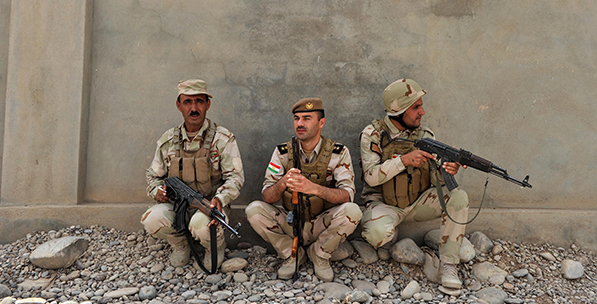It is not necessary to delve too deep into Iraq’s history to understand the crisis today - one need only look into the last decade of a century-old order created by the 1916 Sykes-Picot agreement.
Eighty-seven years after that agreement dismembered the Ottoman Empire, Iraq’s occupation by the United States in 2003 launched a new era in the Middle East. The US, intentionally or not, activated political fault lines in the region.
A second turning point was after so-called elections and a constitutional referendum in 2005, but the critical point before the current crisis took place after 7 March, 2010 elections. Iraq’s political structure, which had been held together by force until that vote, fell apart.
With the election, an ethnic-sectarian political template was realised at the expense of the political structure.
Iraq’s only hope to overcome the ethnic-sectarian political template that had been imposed on it was the al-Iraqiya List, the first political party in Iraq’s history to represent the diversity of the region to such an extent.
Despite the fact that the al-Iraqiya List won the elections, in a scheme necessitated by the US-Iran relations with the Kurds’ passive support, governance of the country was transferred to Prime Minister Nuri al-Maliki.
As a result, not only was an elected political party prevented from governing the country, but any meaning elections might have carried in Iraq was effectively lost.
After this fateful vote the political experience in Iraq was not seen as a democratically elected government, but a vicious cycle of governments determined by ethnic and sectarian affiliations.
It is the political template that was imposed on Iraq that caused the problems it is having both with the minority groups within its borders and its neighbors.
Maliki, since the day he came to power, has roughly moved along two major axes. First, he uses any minor crisis as an excuse to use the sectarian discourse as ammunition and second, he approaches every problem from a security perspective.
IRAQ AND THE KURDS
The fall of Mosul to the Islamic State (IS) in June brought Iraq to the forefront of international attention once again. Ironically, Iraq had not received this much attention even when it was experiencing bloodier episodes in 2012. Had more attention been paid to Iraq when close to 5,000 people a month were dying, there would be no need to talk about IS today.
The distorted political order of 2010, brought about by the 2003 invasion, actually paved the way to what is happening in Iraq today. Nevertheless, various political actors under serious threat today are as much to blame for the current conditions as the invading forces.
The Sunni Arabs, having seriously suffered in the debris Saddam Hussein left behind, were paralysed by the US invasion. The longer they took to produce a political entity with clear parameters, the more opportunity the armed Salafis had to fill the power vacuum.
Another important actor to share the blame was the Iraqi Kurdistan Regional Government. There were both advantages and disadvantages of this region gradually becoming more independent from the central government after the invasion. It sought a way out of the comfort zone in which it had been trapped for the last 10 years while trying to find a compromise with the central government.
The “Kurdish entity” that emerged as a result of both the invasion of Iraq and the uprisings in Syria became the source of both exaggerated fears and expectations. These fears and expectations, which amounted to the same fears and expectations raised by the Sykes-Picot deal, blocked any sound analysis or discussion of the issue.
Those who relied on exaggerated fears perceived every development as another step towards “division and separation”, taking it as far as demonising the Kurds at times.
Those who relied n exaggerated expectations, in neo-Sykes-Pic







